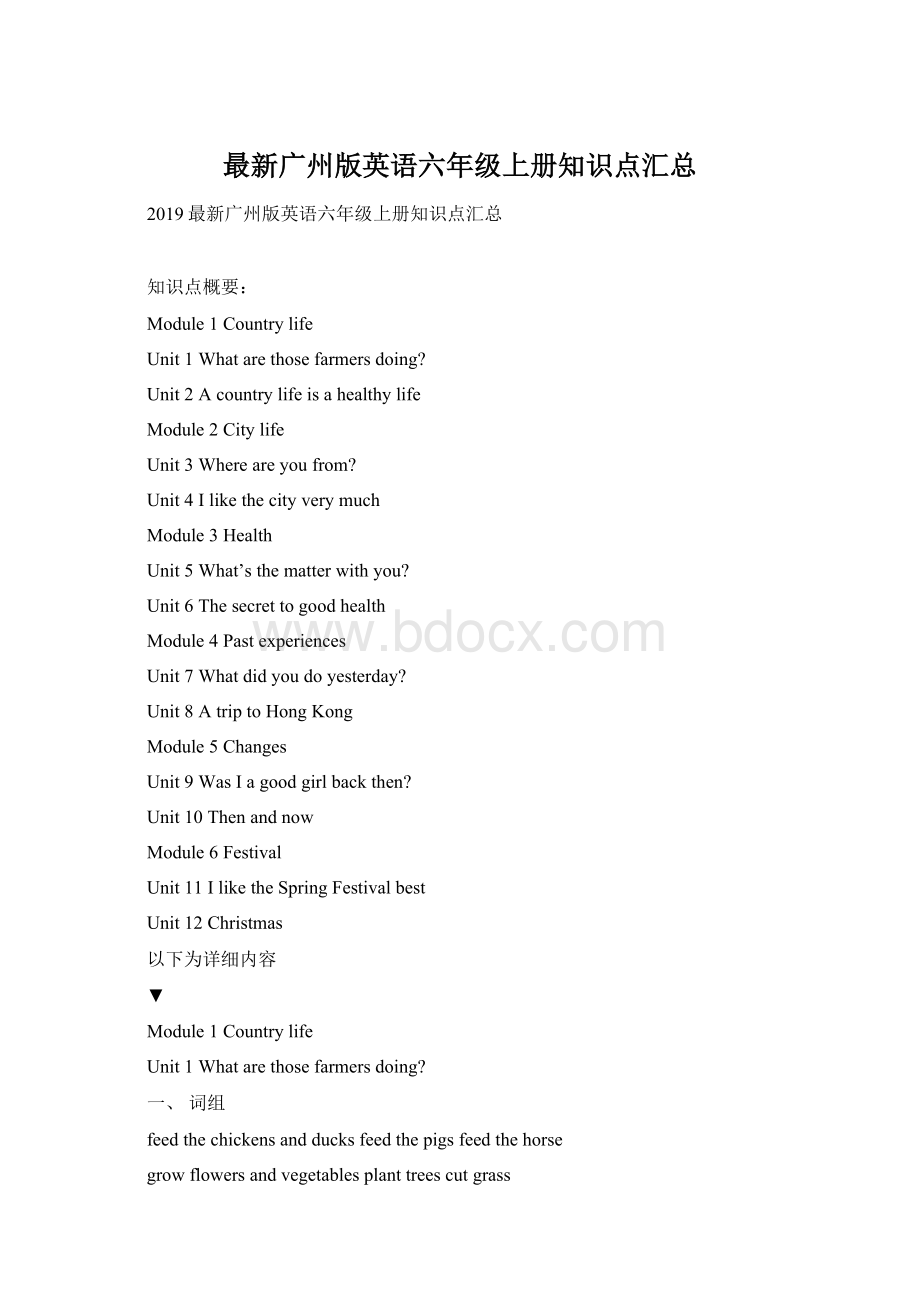最新广州版英语六年级上册知识点汇总.docx
《最新广州版英语六年级上册知识点汇总.docx》由会员分享,可在线阅读,更多相关《最新广州版英语六年级上册知识点汇总.docx(17页珍藏版)》请在冰豆网上搜索。

最新广州版英语六年级上册知识点汇总
2019最新广州版英语六年级上册知识点汇总
知识点概要:
Module1Countrylife
Unit1Whatarethosefarmersdoing?
Unit2Acountrylifeisahealthylife
Module2Citylife
Unit3Whereareyoufrom?
Unit4Ilikethecityverymuch
Module3Health
Unit5What’sthematterwithyou?
Unit6Thesecrettogoodhealth
Module4Pastexperiences
Unit7Whatdidyoudoyesterday?
Unit8AtriptoHongKong
Module5Changes
Unit9WasIagoodgirlbackthen?
Unit10Thenandnow
Module6Festival
Unit11IliketheSpringFestivalbest
Unit12Christmas
以下为详细内容
▼
Module1Countrylife
Unit1Whatarethosefarmersdoing?
一、词组
feedthechickensandducksfeedthepigsfeedthehorse
growflowersandvegetablesplanttreescutgrass
anyotheronthefarmafew…
二、句型:
1.Whatarethosefarmersdoing?
They’recuttinggrasstofeedtheanimals.
2.Whatdoyougrowonyourfarm?
3.Wehaveafewgoatsandpigs.
4.Therearefruittreesinthisfield.
5.Thereisacowonthefarm.
三、重点精析:
1.anyother+名词单数,指一堆当中的的某一个
anyother+名词复数,指一堆当中的一些
如:
Tomrunsfasterthananyotherstudentinhisclass.
汤姆比他班上的任何人都跑得快。
Areyoutakinganyotherdrugsatpresent?
你现在还有服用其他的药吗?
2.表示肯定意义:
alittle/afew有一点,有一些
表示否定意义:
little/few几乎没有的
afew/few+可数名词复数
little/alittle+不可数名词
many/much意为很多的
many+可数名词复数much+不可数名词
3.usesth.todosth.用……做某事
我用钢笔写信。
___________________________________________
4.manyofthem他们中的许多人
manyofusmanyoftheboysmanyoftheyoungmen
5.
他来自中国。
______________________________________________
6.also;too;either的区别
(1)also意思是“也”,是比too较为正式的用语,通常用于肯定句中,一般靠近动词。
如:
Healsoaskedtogo.他也要求去。
Ialsowent.我也去的。
Hecamealso.他也来的。
(2)too意思也是“也”,是最普通的用语,常与also通用,但不如also正式,在口语中它用得更多。
too通常放有句末,它也通常用于肯定句中。
如:
Iwentthere,too.我也到那儿去的。
Motherwasangrytoo.母亲也发怒了。
(3)either意思也是“也”。
它用于否定句中,而且要放在句末。
如:
Ifyoudonotgo,Ishallnoteither.倘若你不去,我也不去
7.give…to…把……给……
givesth.tosb.=givesb.sth.
如:
Amygivesmeabook.=Amygivesabooktome.
8.Thereisacowonthefarm.
Therebe是英语中常用句型,意思是“有”,表示“人或事物的存在”。
There在此结构中是引导词,已经没有副词“那里”的含义。
当主语是可数名词单数或不可数名词时,be动词要用is;当主语是可数名词复数时,be动词要用are;而它的否定形式是在be动词后面加not。
同时,改为一般疑问句只需要把be动词提前。
肯定回答为“Yes,therebe.”
否定回答为”No,therebenot.”
如:
Therearefivebooks,twopensandarulerintheschoolbag.
Thereisaruler,twopensandfivebooksintheschoolbag.
四、重点语法:
(一)名词单复数
(1) 从单数变复数,变形规则如下:
1、一般情况下,直接加-s。
如:
book-books, bag-bags, cat-cats, bed-beds
2、以s. x. sh. ch结尾,加-es。
如:
bus-buses, box-boxes, watch-watches
3、以“辅音字母+y”结尾,变y为i, 再加-es。
如:
family-families(家庭), strawberry-strawberries(草莓)
4、以“f或fe”结尾,变f或fe为v, 再加-es。
如:
knife-knives
5、不规则名词复数:
man-menwoman-womenpoliceman(男警察)-policemen
policewoman(女警察)-policewomenmouse-mice child(孩子)-children
foot-feettooth-teeth
单复同行:
fish-fishsheep(羊)-sheeppeople-people
Chinese-ChineseJapanese-Japanese
6、注意:
当people后加上s时,即peoples表示“民族”
例如:
There are 56 peoples in China. 中国有56个民族。
7、不可数名词 :
water(水) milk(牛奶) tea(茶) rice(米饭) orange(橙汁)juice(果汁)bread(面包)等
注意:
1)可数名词,当表示“1”时用a还是an,由后面的单词的首个因素决定,辅音音素前用“a”,元音音素前用“an”。
如:
abookanEnglishbook
2)不可数名词前不能用a或an,常用some,much,alittle,alotof,plentyof表示多少
3)用单位词表示,即用a…of+名词表示。
如:
acupof一杯……abottleof一瓶……apieceof一张……
abasketof一篮……acanof一罐……abagof一袋……
apairofshoes一双鞋twocupsoftea两杯茶
fivepiecesofpaper五张纸
Unit2Acountrylifeisahealthylife
一、词组
wakeupmorethanplentyofrideabike
gethomeatthattimethanksforlotsof…
二、句型
1.Acountrylifeisahealthylife.
2.Ittakesabout40minutes.
3.IamalwaysverybusybutIneverfeeltired,becauseIhaveplentyofexercise.
4.WhenIgethomeafterschool,thereisstillmuchworktodo.
三、重点精析:
1.livein+大地点liveat+小地点(如街道、街区等)liveon+楼层
2.helpsb.(to)dosth.帮助某人做某事
helpsb.withsth.帮助某人做某事
有时候我帮我妈妈清洁房间。
____________________________________________
我喜欢帮妈妈做家务。
____________________________________________
3.morethan+数词超过,多于
如:
Morethanthirtystudentsareboysinourclass.
morethan+名词不仅仅是
如:
Joeismorethanawriter;heisacook,too.
morethan+形容词很,非常
如:
I’mmorethanhappytoseeyou.
4.plentyof=alotof=lotsof+可数名词复数/不可数名词表示许多、大量
5.Ittakesabout40minutes.这大约要花二十分钟。
(1)Ittakessb.+时间+todosth.表达花费某人多少时间
他花了两天时间去读这本书。
____________________________________________________
从我家到学校大约要花费三十分钟。
________________________________________________
Doingsth.takessb.+时间做某事花了某人多少时间
写作业花了他两个小时。
_________________________________________________
(2)spendtime/moneyonsth=spendtime/money(in)doingsth.
花费时间/金钱做某事
他们花费了一个小时去游泳。
_____________________________________________
(3)sth.costs(sb.)+金钱某物花了(某人)多少钱
这本书花了他五十元。
______________________________________________
(doing)sth.costs(sb.)+时间某物(做某事)花了(某人)多少时间
喂马花了她一个小时。
______________________